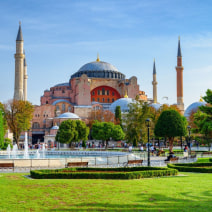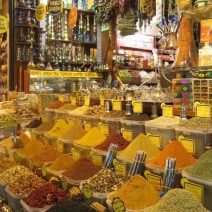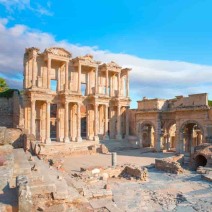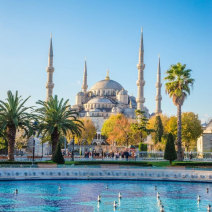Turkey Travel Guide
Turkey, now officially known as Türkiye, a transcontinental country where East meets West. It's a land of rich history, diverse landscapes, and vibrant culture. From the bustling streets of Istanbul, home to the iconic Hagia Sophia and Blue Mosque, to the serene beaches of its Mediterranean coast, Türkiye offers a vast array of experiences that captivate visitors from around the world.
Located at the crossroads of Europe and Asia, Türkiye has a population of approximately 85 million. Its largest city is Istanbul, while the capital is Ankara. The official language is Turkish.
The influence of the Ottoman Empire, which ruled for over six centuries, is deeply embedded in the fabric of modern Türkiye. The Ottomans left an indelible mark on the country's architecture, cuisine, music, and traditions, creating a unique fusion of Eastern and Western influences that define Turkish culture today. This legacy is evident in the grand palaces, mosques, and bazaars that dot the landscape, as well as in the social customs and hospitality that are central to Turkish life.
We've outlined some general information that may be helpful to you when planning your next holiday to Turkey.

Time Zone & Currency
Turkey is two hours ahead of Greenwich Mean Time (GMT) throughout the year. The currency in Turkey is the Lira.

Weather In Turkey
Turkey's weather varies: coastal areas have a Mediterranean climate with hot summers and mild winters, while inland regions experience hot summers and cold winters.

Reading For Your Trip To Turkey
My Name is Red by Orhan Pamuk
Inspector Ikmen Series by Barbara Nadel
Portrait of a Turkish Family by Irfan Orga
Best time to go to Turkey
The best time to visit Turkey is during the spring (April to June) and fall (September to November) when the weather is mild and pleasant. These seasons are ideal for exploring cultural sites and enjoying outdoor activities, with fewer crowds compared to the peak summer months.
Top Tourist Attractions In Turkey
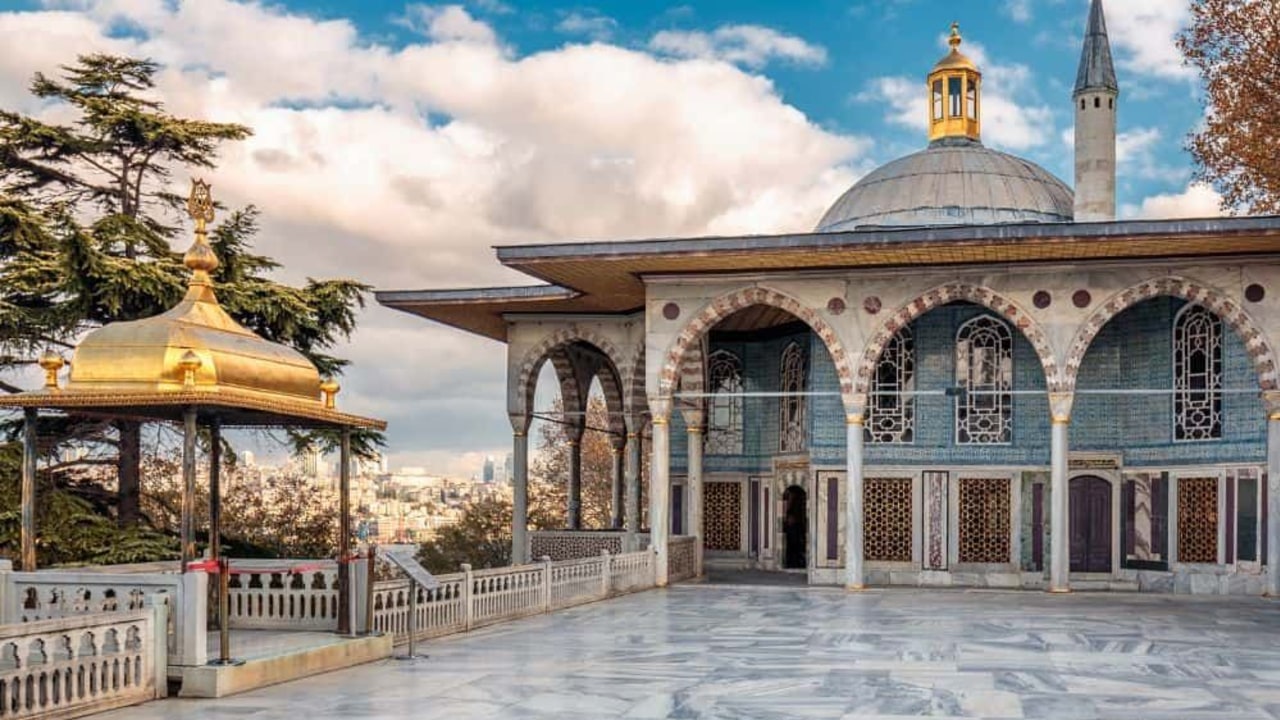
Top 8 highlights of Istanbul
From the lively Grand Bazaar, brimming with colourful stalls and enticing scents, to the beautiful Bosphorus, where Europe and Asia meet, Istanbul is packed with unforgettable highlights waiting to be discovered.

Virtual Tour of Turkey
Our expert and passionate guide Meltem takes us on a captivating tour of Turkey. Learn more about the rich history, vibrant culture, and stunning landscapes of this diverse country.
Food and drink in Turkey
Turkish cuisine is a vibrant fusion of fresh, healthy, and colourful dishes, influenced by centuries of diverse cultural traditions. Some must-try dishes include:
- Kebab: A quintessential Turkish dish of skewered and grilled meats, often served with flatbreads, pickles, and salad.
- Meze: A delightful starter platter featuring an array of vegetables like aubergines, peppers, and beans, paired with olive oil and yoghurt-based dips.
- Börek: A popular snack of crispy filo pastry, filled with spinach and sheep’s milk cheese or minced meat.
- Turkish Breakfast: A hearty spread including fresh bread, honey, jam, sheep’s milk cheese, tomatoes, cucumber, eggs, and black olives, always accompanied by strong black tea.
Turkey is also famous for its aromatic coffee and sweet treats like baklava, making it a destination for food lovers seeking both savoury and sweet delights.
Turkey Travel Guide FAQs
Can you give a brief history of Turkey?
Turkey's history spans thousands of years, beginning with ancient civilisations like the Hittites and Phrygians. The region later became part of the Roman and Byzantine Empires, with Constantinople (now Istanbul) as a key city. In the 11th century, the Seljuk Turks arrived, followed by the rise of the Ottoman Empire in the 14th century, which became a major world power for centuries. The empire collapsed after World War I, leading to the establishment of the Republic of Turkey in 1923 under Mustafa Kemal Atatürk, who modernised and secularised the nation.
Do I need a holiday visa for Turkey?
Irish and UK Citizens do not require a tourist visa to enter Turkey. Six-month passport validity is required from the date of entry to Turkey. Non-EU passport holders should check their visa and passport requirements with the relevant Embassy or Consulate
Is English widely spoken in Turkey?
English is widely spoken, especially in places popular with tourists.
Is there a dress code in Turkey?
In major cities and resort areas, western dress is acceptable. Women do not need to cover their heads unless entering a mosque. In rural areas people may be more conservative hence it is wise not to dress in any way that could cause offence. It may be advisable for men to wear long trousers and for women to carry a shawl or scarf for covering up when required.
Is Turkey safe?
The places visited on your itinerary are generally safe and our guides will always keep an eye out for you. However, in any large city there can be opportunists and pickpockets. It is wise to be vigilant, especially at busy tourist attractions, and always take good care of your personal belongings.
What are the plug sockets in Turkey?
In Turkey the power sockets are of type C and E. These are the two prong outputs. The standard voltage is 220 V and the standard frequency is 50 Hz. We always recommend travelling with a universal adapter as this will be able to work in any country you visit.
What’s the etiquette for tipping in Turkey?
If you are happy with the service from restaurant and hotel staff, then you could tip as you would at home. For taxi drivers, it’s common to round up the fare by a few Lira.
Useful Links
- For up-to-date information regarding entry into Türkiye please see: www.dfa.ie
- Official Turkey Tourism Board: goturkiye.com
